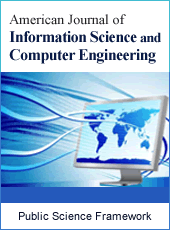American Journal of Information Science and Computer Engineering
Articles Information
American Journal of Information Science and Computer Engineering, Vol.3, No.2, Mar. 2017, Pub. Date: Jun. 14, 2017
Comparative Analysis of Computational Models of Multi Agent System Based on Interaction and Coordination
Pages: 14-18 Views: 3235 Downloads: 846
[01]
Pir Ammad Ali Shah, Department of Computer Science, University of South Asia, Lahore, Pakistan.
[02]
Nabeel Aslam, Department of Computer Science, University of South Asia, Lahore, Pakistan.
[03]
Fahad Riaz, Department of Computer Science, University of South Asia, Lahore, Pakistan.
[04]
Zain Ali, Department of Computer Science, University of South Asia, Lahore, Pakistan.
The aim of our study is to compare the Multi-Agent Models. The purpose of this study is also to find out which model is comparatively better for multi-Agent System on the bases of factors i-e Performance, Fast, Time Efficient, Cost and Learning. Under positivism paradigm, descriptive research design has been used in this study. It compares the Computational model of multi agent system to find the best model out of these for specific situations and to build better interaction and coordination between Agents. In addition to that, the environmental factors that affecting the multi-Agents also addressed. The models used in this study are Trust Model, Selection Model, Meta Model, Synchronous execution Model and Interleaved Execution Model. Findings of this study indicated that Synchronous execution Model is fast and better model out of these models. Results also indicated that Synchronous execution Model help to build better interaction and coordination between multi Agents Systems.
Multi-Agent, Coordination, Interaction, Confidence, Trust
[01]
Ferber, J., & Gutknecht, O. (1998, July). A meta-model for the analysis and design of organizations in multi-agent systems. In Multi Agent Systems, 1998. Proceedings. International Conference on (pp. 128-135). IEEE.
[02]
Mi, P., & Scacchi, W. (1996). A meta-model for formulating knowledge-based models of software development. Decision Support Systems, 17 (4), 313-330.
[03]
Ramchurn, S., Sierra, C., Godó, L., & Jennings, N. R. (2003). A computational trust model for multi-agent interactions based on confidence and reputation.”
[04]
Ramchurn, S. D., Huynh, D., & Jennings, N. R. (2004). Trust in multi-agent systems. The Knowledge Engineering Review, 19 (01), 1-25.
[05]
Jennings, N. R., Faratin, P., Lomuscio, A. R., Parsons, S., Wooldridge, M. J., & Sierra, C. (2001). Automated negotiation: prospects, methods and challenges. Group Decision and Negotiation, 10 (2), 199-215.”
[06]
Tuyls, K., Verbeeck, K., & Lenaerts, T. (2003, July). A selection-mutation model for q-learning in multi-agent systems. In Proceedings of the second international joint conference on Autonomous agents and multiagent systems (pp. 693-700). ACM Michael John WollDridge “A logical Modelling Of Computational Multi Agent System”.
[07]
Maalal, S., & Addou, M. (2012). A new approach of designing Multi-Agent Systems. arXiv preprint arXiv:1204.1581.”
[08]
Börgers, T., & Sarin, R. (1997). Learning through reinforcement and replicator dynamics. Journal of Economic Theory, 77 (1), 1-14.
[09]
Akin, E., & Losert, V. (1984). Evolutionary dynamics of zero-sum games. Journal of mathematical biology, 20 (3), 231-258”.
[10]
Pavón, J., Gómez-Sanz, J., & Fuentes, R. (2006, July). Model driven development of multi-agent systems. In European Conference on Model Driven Architecture-Foundations and Applications (pp. 284-298). Springer Berlin Heidelberg.

ISSN Print: 2381-7488
ISSN Online: 2381-7496
Current Issue:
Vol. 7, Issue 3, September Submit a Manuscript Join Editorial Board Join Reviewer Team
ISSN Online: 2381-7496
Current Issue:
Vol. 7, Issue 3, September Submit a Manuscript Join Editorial Board Join Reviewer Team
| About This Journal |
| All Issues |
| Open Access |
| Indexing |
| Payment Information |
| Author Guidelines |
| Review Process |
| Publication Ethics |
| Editorial Board |
| Peer Reviewers |


